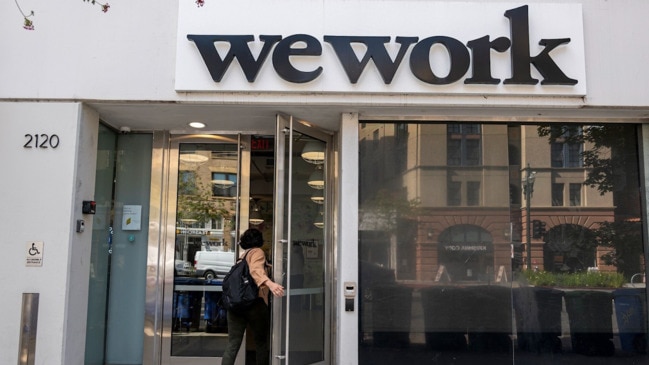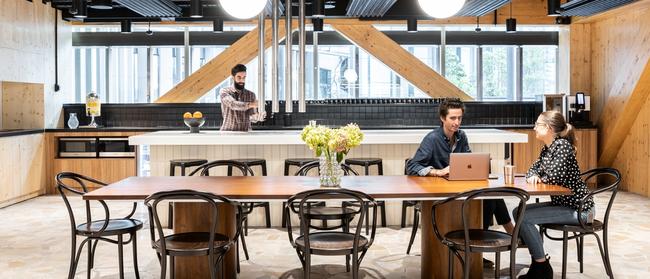WeWork files Chapter 11 bankruptcy in US but remains ‘committed’ to Australia
Global flexible office giant WeWork has filed for bankruptcy in the US and questions hang over its loss-making Australian operations which remain open.

The collapse of co-working giant WeWork in the US has put some the heat on some of Australia’s biggest landlords and thousands of tenants around the country as the company seeks to restructure billions of dollars worth of global lease commitments.
WeWork, which was considered a world leader in the flexible workplace sector and in 2019 was valued at $US47bn, on Monday night (AEDT) filed Chapter 11 bankruptcy in the US unable to cope with the impact of the covid pandemic and the top of the market leasing rates it had signed.
The company said the Chapter 11 process would only impact on its US and Canadian operations. Its 15 remaining Australian locations remained “open and operational”.
“WeWork’s operations in Australia are not a part of this process and it remains business as usual,” it said.
“Australia remains a key market for WeWork and we are fully committed to providing our members here with world-class, flexible workspace solutions for the long term.
“Our commitment to Australia is unwavering as we continue to work collaboratively with our landlord partners, aiming to craft solutions that set all parties up for sustainable success.”
Like many other co-working and flexibly space providers WeWork was hurt by the covid pandemic which inspired the working-from-home trend putting pressure on its model – leasing small flexible and short-term spaces on sites which it has long-term contracts which it subleases to tenants.
According to documents filed with the Australian Securities and Investments Commission WeWork Australia reported a loss of $211.2m in the 2022 calendar year compared to $120.3m in 2021.
The loss was partly driven by $155m of property, plant and equipment and right-of-use asset impairment expense in 2022 compared to $4.4m in 2021.
In October WeWork kicked off lease renegotiations on its properties in its loss-making Australia operations and appointed Hilco Real Estate to manage the process across its Brisbane, Sydney, Melbourne and Perth offices. According to Rubberdesk the company current offers a median coworking desk rate of $244 per person.

An industry insider said he understood that tenants have returned to WeWork properties post covid and occupancy was picking up.
“But I suppose it all really depends on whether the Australian operations gets caught up in the bigger machine,” he said.
WeWork announced the closure of its Brisbane CBD office at 260 Queen St in Post Office Square, having already said it will stop operating at 50 Miller St and 66 King St in Sydney.
Further closures have not been ruled out while it rolls out a campaign to “right its cost structure”.
Two of Australia’s biggest landlords Charter Hall and Dexus have minimal exposure.
Charter Hall’s 333 George St in the Sydney CBD has a WeWork (4300sq m). But the company declined to comment. Dexus Property has two WeWork tenancies at 5 Martin Place (3200sq m) and 100 Harris St (8000sq m) in Sydney and also declined to comment.
It is understood WeWork makes up less than 1 per cent of the total Dexus office space and the property giant has a bank guarantee to support WeWork’s lease obligations.
A research note from Morgan Stanley said since 2016 WeWork accounted for 10 per cent of all co-working leases but only 1 per cent of office space in the Sydney and Melbourne CBDs.
Headquartered in New York, under its founder Adam Neumann WeWork Inc grew to be the most valuable US start-up, worth $US47bn and attracted blue chip investors including Japanese technology company SoftBank Group.

Mr Neumann was forced out and replaced by Sandeep Mathrani which took as the start-up to a listing in 2021 at the height of the pandemic and he was replaced in 2023 by Mr Tolley who engaged in debt restructurings, yet this was not enough to stave off its bankruptcy.
SoftBank Group owns about 60 per cent of the global company and he move to Chapter 11 was a sign the could no longer prop the business up.
The company last week secured a seven-day extension from its creditors on an interest payment, to win more time to negotiate with creditors and investors.
According to bankruptcy filing on Monday WeWork Inc reported estimated assets and liabilities ranging from $US10bn to $US50bn.
It said it maintained strong support of its key stakeholders and has entered into a Restructuring Support Agreement with holders representing about 92 per cent its secured notes to “drastically reduce” the company’s existing funded debt and expedite the restructuring process
Mr Tolley told shareholders that the global company had strong foundations.
He said the Chapter 11 process will help it rationalise WeWork’s commercial office portfolio by working collaboratively with its landlord partners while focusing on business continuity.
“Now is the time for us to pull the future forward by aggressively addressing our legacy leases and dramatically improving our balance sheet,” he said.
Its share price has fallen from $US520 two years ago to $US84c on Monday after trading was halted ahead of the opening Bell of the New York Stock Exchange.





